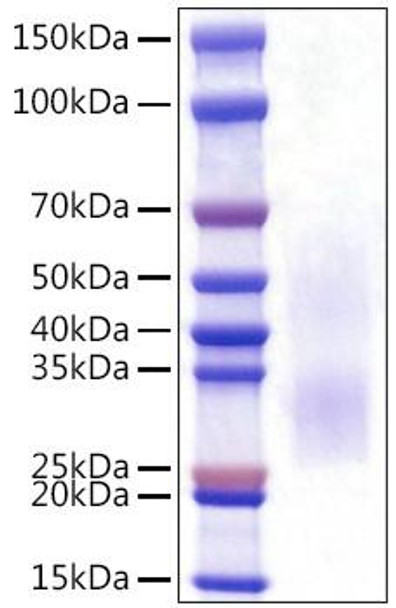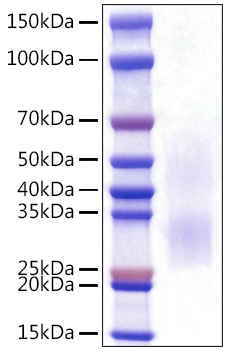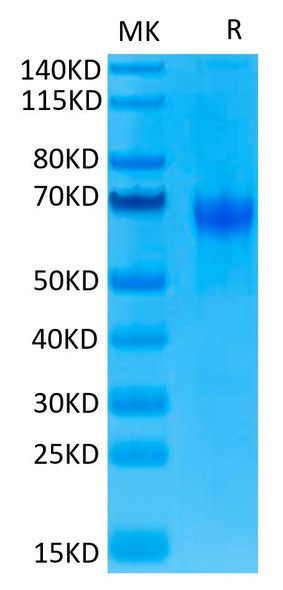Description
Recombinant Rat PD-1/PDCD1/CD279 Protein
The Recombinant Rat PD-1/PDCD1/CD279 Protein is a high-quality recombinant protein produced for advanced research applications in molecular biology and biotechnology. This protein serves as a critical reagent in various experimental contexts, including functional studies, binding assays, and therapeutic development programs, providing researchers with a standardized and reliable tool for investigating protein function and interactions.
This product (SKU: RPCB1578) is produced using HEK293 cells and features a C-His tag for convenient detection and purification. The protein exhibits a calculated molecular weight of 17.06 kDa with an observed molecular weight of 30-50 kDa under denaturing conditions, achieving ≥ 95 % as determined by SDS-PAGE., ensuring exceptional quality and consistency for research applications.
Key Features
| High Purity by Affinity Chromatography | |
| Mammalian & Bacterial Expression Systems | |
| High lot-to-lot consistency via strict QC |
| Product Name: | Recombinant Rat PD-1/PDCD1/CD279 Protein |
| SKU: | RPCB1578 |
| Size: | 10 μg , 20 μg , 50 μg , 100 μg |
| Reactivity: | Rat |
| Synonyms: | CD279, mPD-1, SLEB2, PDCD1, PD1, PDCD1 |
| Tag: | C-His |
| Expression Host: | HEK293 cells |
| Calculated MW: | 17.06 kDa |
| Observed MW: | 30-50 kDa |
| Gene ID: | 301626 |
| Protein Description: | High quality, high purity and low endotoxin recombinant Recombinant Rat PD-1/PDCD1/CD279 Protein (RPCB1578), tested reactivity in HEK293 cells and has been validated in SDS-PAGE.100% guaranteed. |
| Endotoxin: | < 0.1 EU/μg of the protein by LAL method. |
| Purity: | ≥ 95 % as determined by SDS-PAGE. |
| Formulation: | Lyophilized from a 0.22 μm filtered solution of PBS, pH 7.4. |
| Reconstitution: | Centrifuge the vial before opening. Reconstitute to a concentration of 0.1-0.5 mg/mL in sterile distilled water. Avoid vortex or vigorously pipetting the protein. For long term storage, it is recommended to add a carrier protein or stablizer (e.g. 0.1% BSA, 5% HSA, 10% FBS or 5% Trehalose), and aliquot the reconstituted protein solution to minimize free-thaw cycles. |
| Storage: | Store at -20℃.Store the lyophilized protein at -20℃ to -80 ℃ up to 1 year from the date of receipt. After reconstitution, the protein solution is stable at -20℃ for 3 months, at 2-8℃ for up to 1 week. |
Programmed cell death 1, also known as PDCD1, is a type I transmembrane glycoprotein, and is an immunoreceptor belonging to the CD28/CTLA-4 family negatively regulates antigen receptor signaling by recruiting protein tyrosine phosphatase, SHP-2 upon interacting with either of two ligands, PD-L1 or PD-L2. PD1 inhibits the T-cell proliferation and production of related cytokines including IL-1, IL-4, IL-10 and IFN-γ by suppressing the activation and transduction of PI3K/AKT pathway. In addition, coligation of PD1 inhibits BCR-mediating signal by dephosphorylating key signal transducer. PD1 has been suggested to be involved in lymphocyte clonal selection and peripheral tolerance, and thus contributes to the prevention of autoimmune diseases. Furthermore, PD1 is shown to be a regulator of virus-specific CD8+ T cell survival in HIV infection. As a cell surface molecule, PDCD1 regulates the adaptive immune response. Engagement of PD-1 by its ligands PD-L1 or PD-L2 transduces a signal that inhibits T-cell proliferation, cytokine production, and cytolytic function.







